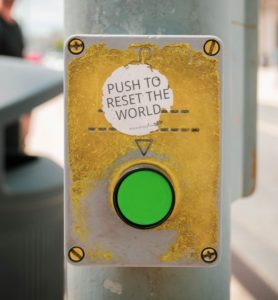We don’t know about you, but our self-care journey has lots of hills and valleys. Sometimes we seem to be absolutely rocking our self-care: We’re doing what we love, we feel calm and grounded, and life feels the way we want it to feel. Other times? Our self-care feels like it is a mess, we feel frazzled all of the time, and we’re squinting hard at our lives wondering if anything in there is self-care at all. (Brushing our teeth? We do that every day…. Most days.)
This self-care journey has been particularly hard during coronavirus lockdown. Our access to our usual activities has been limited, we can’t see all of the people we love, and big changes in our lives (like our kids suddenly being homeschooled or losing jobs) take a lot of energy to respond to (and take away our time).
How much self-care is enough? Only you can answer that. We are all diverse humans and we have diverse needs.
On top of that, our brains have been (understandably) in pandemic emergency mode, which makes us hypervigilant and over-aroused. This is a lot of wear and tear! We responded with #smallwinselfcare – that was great for an emergency, but as the world re-opens we find ourselves needing a bit more.
These ups and downs are enough to make anyone feel like a self-care failure, even us. It can be tempting to throw our hands up and say “I just can’t do this!” and decide to put self-care low on our priorities. Or to feel guilt: “We will never be able to do this right!”
The reality, however, is that these ups and downs are just part of normal life. In fact, in our research, health care trainees began their self-care journeys over and over and over again as needed, in order to develop their self-care strategies. They repeated this cycle many times, learning something new each time in the process.

The good news? We’re allowed to do a reset whenever we want to. And we get an unlimited number of them to use, forever! We’re even allowed to let go of the shame and blame about our past “failures” and move forward without them. Buh-bye shame! So long guilt! Each time we try again we learn a little bit more. It’s all practice!
This is the essence of self-compassion when it comes to self-care. This month, we’re inviting you to take a self-compassionate, no shame/no blame, self-care do-over with us. Take a deep breath, shake off the past, and step forward into the energy of a do-over.
In this do-over, we’re going to focus on 3 steps:
- Doing Enough
- Goal Setting
- Finding Time for Self-Care
In this blog post we’re going to talk about Steps 1 & 2; later this month we’ll talk about strategies for finding time for self-care.
Doing Enough
Sometimes the challenge with self-care is figuring out how much of it to do. When we reset, we might be tempted to make really lofty self-care goals. This is because we feel super energized by a reset and ready to tackle anything! This is a self-care hill – we’re on top of our self-care world! But eventually, life creeps back in and we find ourselves moving toward a possible self-care valley. We have to work late, or someone in our family gets sick. (Or a pandemic strikes….)
We’re allowed to do a reset whenever we want to. And we get an unlimited number of them to use, forever! Take a deep breath, shake off the past, and step forward into the energy of a do-over.
In order for our self-care to stick when life gets tough, it needs to be balanced between too much (e.g., doing something every day, spending a lot of money or time on self-care) and too little (e.g., too infrequent, not long enough in each setting, giving away our self-care time to other tasks). We need to find enough self-care that balances us out.
How much self-care is enough? Only you can answer that. We are all diverse humans and we have diverse needs. One person’s perfect level of self-care might make another person feel anxious and idle! How do you know when you’ve found “enough”? Here are a few indicators that work for us:
- You regularly experience a sense of flow when doing activities, where you lose yourself in them (losing all sense of time)
- You are sleeping better
- You have more energy
- You might enjoy your career a little bit more
- You feel grounded and calm
Goal Setting
The second part of a do-over is setting a goal for how much you will… do! Sadly, self-care doesn’t tend to do itself (unless you are really a self-care wizard!) and we’re more likely to do something that we plan to do.
Being able to set a goal depends first on knowing what self-care activities you wish to engage in. If you’re unsure of that, we encourage you to go back and read our posts on how values relate to self-care, and how to figure out your values and translate them into strategies and activities. This is tightly linked to the idea of “doing enough” and no more (or no less).
We know you want to go for a run every day.
Or paint a masterpiece.
Or learn how to cook amazing homemade sourdough bread.
Or systematize something at work so it flows more easily.
Or mentor all of the students you can.
But you must check in with yourself and have an honest conversation before you decide to do that: Is this doing enough? Or is doing too much? Or too little?
Once you’ve figured out doing enough for YOU then it’s time to set some goals, like:
- Run twice this week, on Tuesday & Thursday at 7pm
- Paint for 30 minutes every day
- Ask my friend for some sourdough starter and google what exactly I’m to do with it…
- Block off Friday afternoon to tackle that pesky work task
Spend some check-in time this week reflecting on what you’d like to do for yourself, and starting over from a modest goal.
Remember the 5 Ws for Goals:
- What (am I going to do?),
- Why? (am I doing this? What value does this meet?),
- Who (if anyone, am I doing this with? Do I need to help me with this self-care?),
- Where? (will I do it?), and
- When (will I put this on my schedule?)
So that is our simple guidance about resetting: be easy on yourself. Deviating from your self-care plan should never be thought of an issue or a failure of will. External demands, which are real, not only impose themselves on our self-care time, they can trap us within their narrow focuses, so that our need for self-care fades into the background. But you always have the power of re-thinking and re-setting.
In self-care solidarity,

Want more?
Sign up for our mailing list for tips, updates, and to be the first to know when our courses launch.
